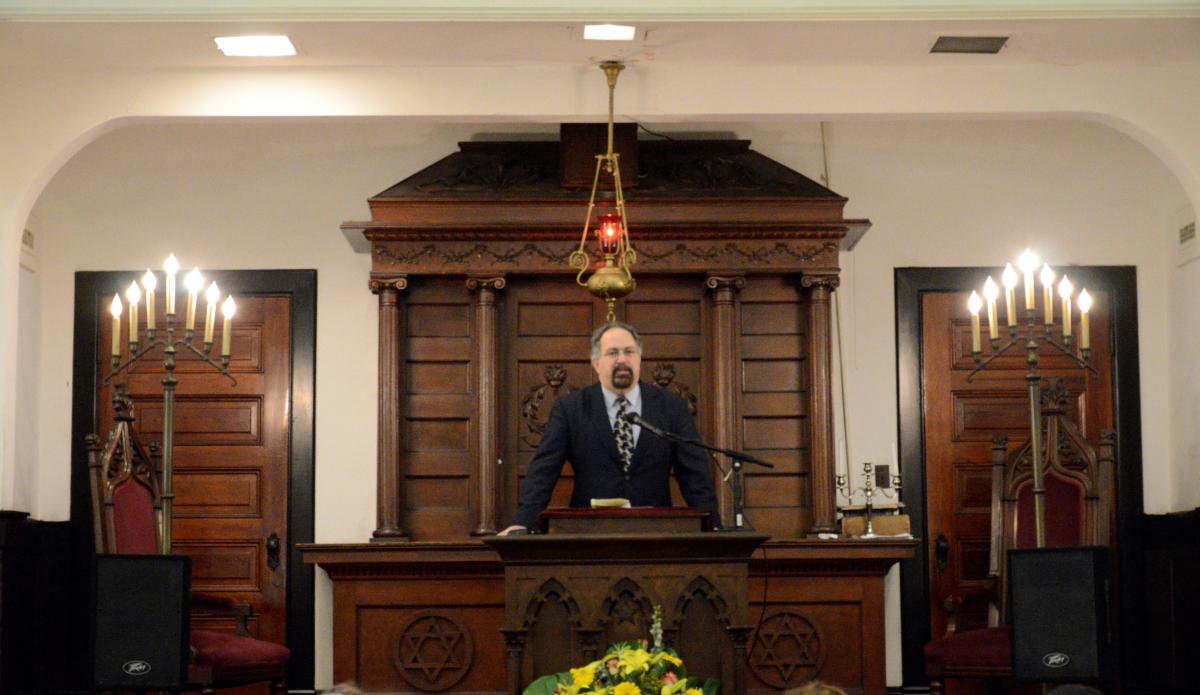By Rabbi Randall Konigsburg, Temple Beth-El, Birmingham, AL
 Between the recent movie and the visit of President Obama the previous day, there was a great deal of anticipation as we drove down from Birmingham to mark the 50th anniversary of the march in Selma that spurred action on voting rights in 1965.
Between the recent movie and the visit of President Obama the previous day, there was a great deal of anticipation as we drove down from Birmingham to mark the 50th anniversary of the march in Selma that spurred action on voting rights in 1965.
Our program took place at Temple Mishkan Israel, the small synagogue in Selma, right on Broad street, just down the street from the Pettus Bridge, the scene of the attack 50 years ago by Alabama State Troopers and County Sherriff deputies on the 300 “foot soldiers” who were marching for the right to vote.

Mishkan Israel has only ten members today, who work hard to keep up the building. There were 200 Jews and non-Jews from as far away as Florida and Montana who gathered to hear about the Jewish role in the Civil Rights movement. We heard introductions by Steve Grossman, president of Mishkan Israel, and Rabbi Elliot Stevens from Montgomery, AL. Rabbi Fred Guttman of Greensboro, NC introduced Rev. William Barber, the founder of the Moral Monday Movement. Rev. Barber spoke passionately about what he calls “fusion politics”, lobbying the state legislatures about causes that all faiths can support: health insurance for the poor, living wages, the right for labor to organize, and of course, voting rights that are being limited once again now that states are not subject to federal oversight of their voting laws. He noted with irony that Bloody Sunday was about voting rights and now 50 years later we need to defend the right to vote once again from those who seek to limit who can vote.
We heard also from David Goodman, the brother of Andrew Goodman, who was lynched in Mississippi along with James Earl Chaney and Michael "Mickey" Schwerner for registering black voters. David spoke of his older brother and noted that he was lynched in what was the first and only bi-racial lynching in the United States. In fact, if James Chaney has been murdered alone, it would not have made the news. Only because two white men were murdered with him made the difference in how the country responded since, as David said, “in those days black lives didn’t matter”.
We heard from Rabbi Jonah Pesner, the Director of the Religious Action Center for Reform Judaism who spoke about the many projects the RAC is working on, many of which are also concerns of Rev. Barber and his Moral Monday Movement.
There was a surprise visit by Peter Yarrow who spoke of his work in Civil Rights and how the song “Blowin’ in the Wind” became an anthem for the movement. He then led the entire group in singing the song. It was a very moving moment.
In my introduction to Dr. Susannah Heschel, I reminded the participants that Dr. Abraham Joshua Heschel was a professor at the Jewish Theological Seminary and influenced generations of students to see social action as an important part of being a rabbi.
Dr. Susannah Heschel then spoke about her father and the Civil Rights movement. She noted that this anniversary is less about the role of Jews in Civil Rights but what the Movement means to Jews. She recalled that her father once wrote that the first Civil Rights conflict was the conflict between Moses and Pharaoh and how different the world would have been if Pharaoh had granted Moses the rights he demanded and both peoples would have stood at the foot of Sinai to receive the law.
We had a surprise visit by Clarence Jones, Counsel to Rev. Martin Luther King Jr. and now teaching at a University in San Francisco. He said that those who marched in Selma have to keep telling the story of that march and the struggle for Civil Rights. He said, “If the lions don’t tell the story, then the hunters will be left to tell it.”
The closing prayer was given by Rabbi Aaron Pankin, the president of HUC/JIR. Doug Mishkin then led us in song as we stood together in unity. We all sat together for lunch and then went down the street to march with the 80.000 others who had come to Selma to once again cross the Pettus Bridge and to remember all those who died in the struggle 50 years ago. There were signs remembering the four little girls who died in the bombing of the 16th Street Baptist Church in Birmingham, there were picutres of the three who were murdered in Mississippi, and there were signs carried by marchers insisting that “Black Lives Matter”. There were so many marching that day that the bridge was covered by a moving sea of people and that cell service and even data service to cell phones was completely overwhelmed.
We drove home exhausted but filled with hope that what once brought change to this country could again bring about the changes needed today. And we carried with us a renewed sense of urgency to bring about a better world that was built on the moral principles that once fueled the Civil Rights Movement 50 years ago.
